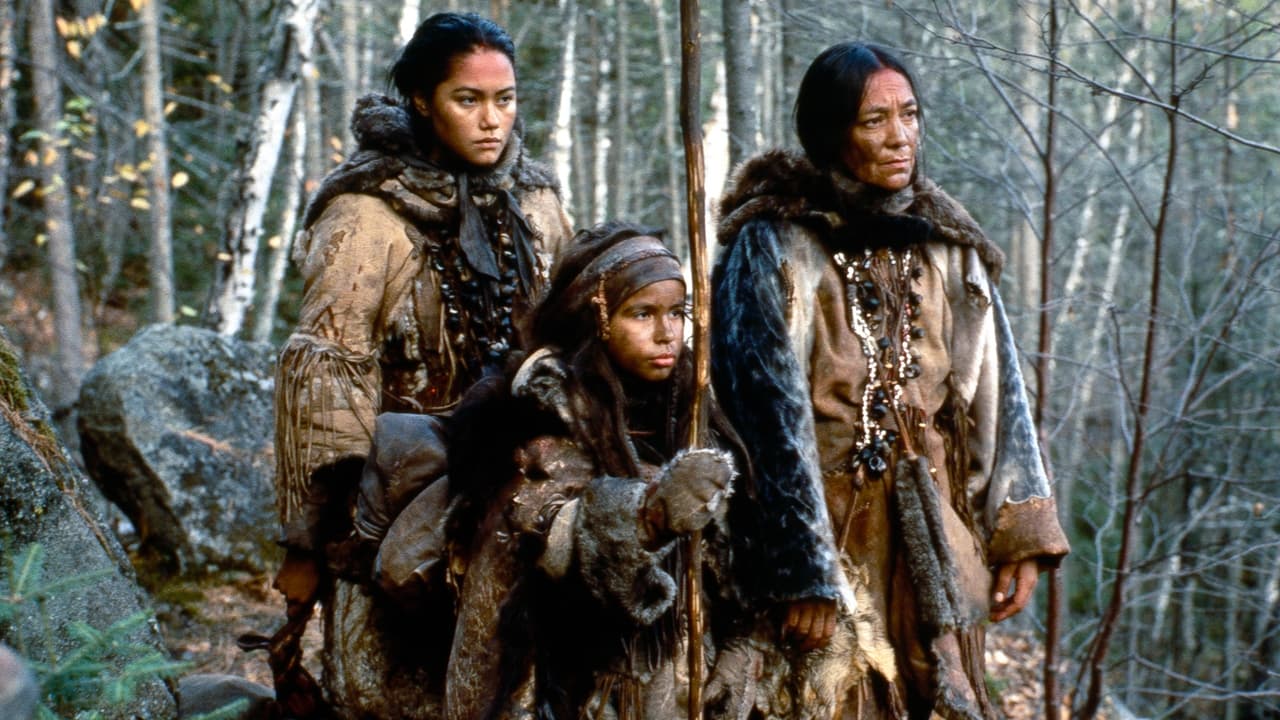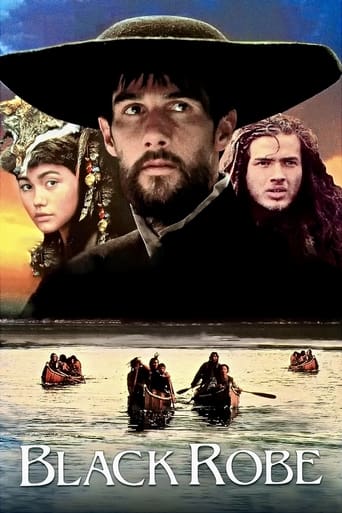

From my favorite movies..
... View MoreIt's funny watching the elements come together in this complicated scam. On one hand, the set-up isn't quite as complex as it seems, but there's an easy sense of fun in every exchange.
... View MoreHow wonderful it is to see this fine actress carry a film and carry it so beautifully.
... View MoreIt's a good bad... and worth a popcorn matinée. While it's easy to lament what could have been...
... View MoreA film adaptation of Brian Moore's novel of the same title, which I haven't read. It concerns a 1634 expedition, starting from Quebec, up the St. Lawrence, and beyond to a Huron mission, led by Jesuit LaForgue, who wears the traditional black robe and broad-rimmed hat. Another member, Daniel, speaks Algonquin, and initially professes an interest in becoming a Jesuit, if he returns. There are also several canoes filled with Algonquin guides and some of their family. This includes Chomina, his wife, and marriageable daughter, Annuka. Along the way, they encounter another Algonquin tribe, as well as Mohawks, who take them prisoner, and Hurons suffering a smallpox epidemic.To me, the most revealing character is Daniel: the laymen who accompanied LaForgue on this expedition. When LaForgue talks up the advantages of Christianity to the Indians, Daniel notes that they are already acting more like true Christians than most Europeans, in that they live for each other, and forgive things that most Europeans would not forgive. They also have their own idea of an afterlife. They believe that the spirits of the deceased emerge at night to hunt the spirits of departed animals. They are not interested in a place where most of the spirits are Westerners, and where the spirits aren't allowed to smoke tobacco or make love to female spirits . Daniel, having the advantage of speaking Algonquin, feels more at ease with their beliefs and customs. Thus, he soon begins a sexual relationship with Annuka. However, it's clear she's not a virgin, as he watches her making love with an Indian in their Tepee. Also, she flaunts her sexuality toward the Iroquois guard of their tepee, when awaiting death in the morrow, to chance a possible rendering of the guard unconscious. This promiscuity doesn't particularly bother Daniel, although LaForgue considers it a sin for him to lust after even an unmarried girl. Annuka's father discourages her from continuing a relationship with Daniel, claiming he is ugly and a stupid European. Annuka thinks it's very strange that LaForgue isn't interested in sexual relations. In consequence, she suspects he may be a devil. But Daniel explains that his position requires him to be celibate. The last part of the film follows LaForgue, alone of the original party. Thus, we are left wondering what became of Daniel and Annuka, who are left at the threshold of entering the Huron mission.When LaForgue enters the Huron mission, and finds all the Europeans killed, except Rev. Jerome, Jerome tells him that the Hurons killed them because they blamed them for the smallpox epidemic, thinking that this plague was unleashed on them because they resisted converting to Christianity. Historically, frontier doctor Marcus Whitman along with other Europeans, were massacred because the Indians noticed that his European measles patients mostly recovered, whereas his Indian patients seldom did. I agree that LaForge and the Indians(Algonquin and Huron)gradually became more tolerant of the other's customs and thinking. He began to see the Indians as more than just fodder for his conversion ambitions. At the end, the Hurons ask if he loved them. After some delay, he answered "yes". Then, he baptized them with the understanding that this would not cure or prevent their smallpox sickness, but would qualify them to a chance of entering heaven.
... View MoreInteresting drama, set in 17th century Canada. Plot is solid, though takes a while to develop. After a point, however, it becomes a good adventure/survival story. Obviously many of the points the director Bruce Beresford and writer of the book and screenplay, Brian Moore, wanted to make with the movie are the effects of religion, and its messengers, on the unconverted masses it comes into contact with. This is done reasonably well, and some of the reactions of the natives are quite interesting, and very plausible. However, the ultimate conclusion is a bit unsatisfactory, and overly simplistic.Decent performances, though none stand out.
... View MoreI felt compelled to register and leave a review after reading a couple of the old critics reviews. The end left one thinking it was all heading to nothing?! Bleakness for the sake of bleakness etc. The end is excellent and beautifully portrayed to the extent didn't you love them all as well. It ends with a beautifully poignant moment and the little history that comes up confirms the end for the priest was not about the result or fruits (unlike the old priest who was willing to sell baptism as magic for conversations) but the faith itself, which actually ended being forged through his journey from an intellectual concept to one of love, the message of Christianity. Do you love us Black Robe, the faces and yes, genius. Lovely pace and rhythm to it and the man who felt it was all in bleak grey weather should go to a tanning salon, Canada-winter!, I will give it 10 not because I believe it but its a hell of a lot more than 7.1 when you look at the score of some superficial s... on this site. Loved it. ps one critic thought his point about Indians having gods put across nebulously, eh clarity is not simplistic. I was clear what he was saying and it was not judgemental, that was the joy, there is no answer,live with or watch Hollywood smuck the whole of your life and don't go out. It was pretty close to art which is not common in commercial film.
... View More"Black Robe" is a beautifully filmed, sensitive and in the end emotionally moving film depicting the work of French Jesuit missionaries in New France in the 17th century and their interactions with the natives (particularly the Hurons) of the region. The real power of the movie comes from the authenticity with which both the Jesuits and the natives are portrayed. Too often we get caricatures from Hollywood. Missionaries and natives are either romanticized or demonized. But this isn't a big-budget Hollywood production. It's a Canadian-Australian film that presents a pretty balanced view of both groups. Neither are innocent: the Jesuits perhaps a bit too rabid in their determination to challenge what they perceive as the "savage" native culture, the natives perhaps a bit too cruel in their response to the Jesuits - but such is culture of any kind. All societies have their good and bad features. Overall, the good outweighed the bad for both cultures in this movie. The natives are depicted as having a rich culture and spirituality of their own; the Jesuits are depicted as having a true and sincere "love" for the natives and truly believe that they are offering them "paradise" by sharing their religious faith with them. The natives are shown quite appropriately as having mixed reactions to their European "visitors." They're intrigued by them and yet also recognize the dangers that European incursion pose for their culture. The Jesuits have an equally mixed reaction to the natives: appalled by what they perceive (by European standards) as some of the less civilized aspects of the culture, but also recognizing them as people loved by God and therefore deserving of love from them. I thought the story did a great job of balancing all of these different perspectives.Also a highlight here was a superb performance by Lothaire Bluteau as Father Laforge - the Jesuit priest whose missionary journey we follow after he's dispatched from Quebec by Champlain and heads for the inland Huron mission. Bluteau seemed to capture the character perfectly - both his hesitancy about the natives and his very sincere love for them. In fact, I found a scene near the end of the movie to be extremely moving, as a group of sick Hurons approach Bluteau at the mission and ask to be baptized. As Bluteau seems to hesitate (he's previously suggested that the natives shouldn't be baptized without a firm understanding of the faith) the leader of the group asks "do you love us." As Bluteau looks over the desperate people in front of him and remembers some of those he's encountered in the past he's finally moved to respond simply "yes" and the baptism proceeds. Too often the portrayal of European colonization of America portrays only the greed and self-interest of the Europeans. That's undoubtedly true in so many ways and demonstrated by so much tragedy for North American natives, but one should recognize that, especially in New France, the early Jesuit missionaries were in fact motivated by a sincere love for the natives. It may be hard to understand from a 21st century perspective, but offering Christ and the Gospel to the natives in that context was done out of love. Religion is so often offered in caricatures and portrayed in a negative or comic light today that to see it portrayed in a noble and loving way may grate on some viewers who can't understand that. But this movie, I thought, was a wonderful and realistic portrayal of the Jesuit motivation of the era, and a fair portrayal of native culture and response to the Jesuits.Strengthened by some stunning scenery which offered a very authentic feel to the "New France" being depicted, this is a very strong movie. If one can't imagine a movie featuring natives to be anything but bloodthirsty savages or missionaries being anything but greedy exploiters then the reaction to this will be negative. But anyone interested in a realistic and thoughtful presentation of the era and cultures and motivations depicted will find this well worth watching. (7/10)
... View More